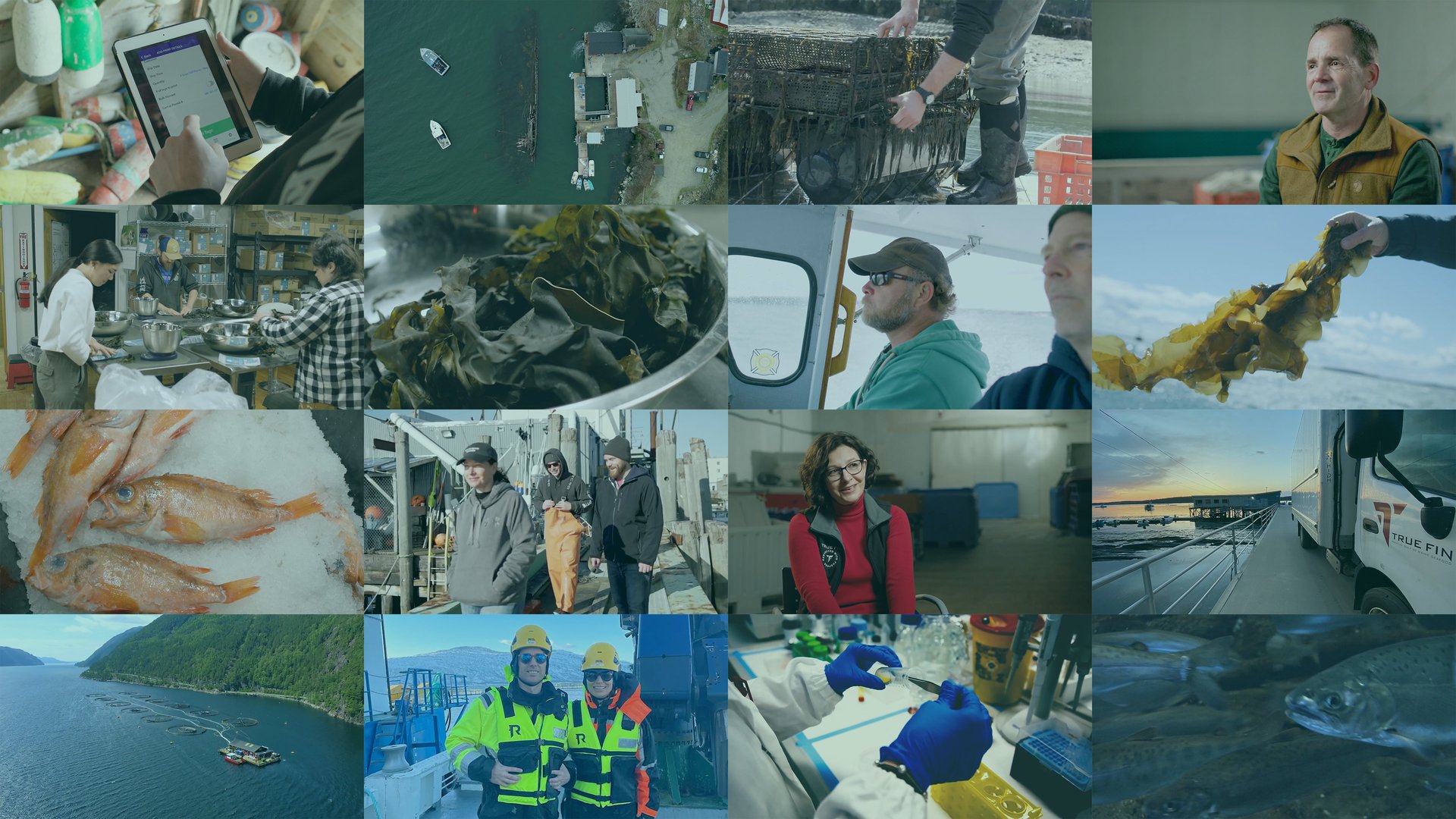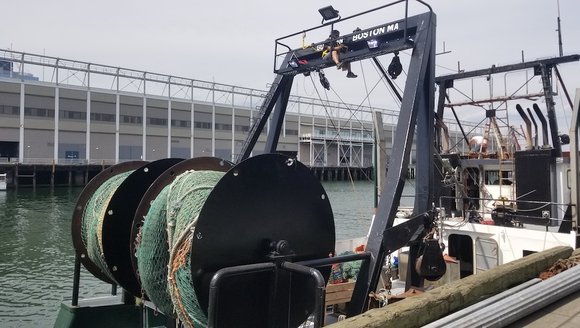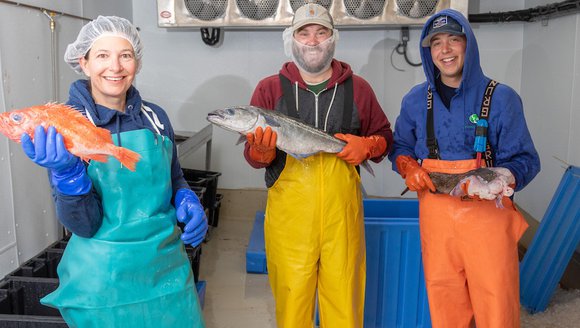Entrepreneurship in the Blue Economy
Perspectives | Aug 2, 2022
by Blaine Grimes
Chief Ventures Officer, GMRI
Chief Ventures Officer Blaine Grimes celebrates four examples of blue economy entrepreneurs making an impact in our region.

Two years ago, we developed and launched Gulf of Maine Ventures to augment our non-profit mission with market-based solutions that serve the Gulf of Maine ecosystem and the people who depend on it.
Our new Entrepreneurship in the Blue Economy video series highlights the BlueTech industry's current-and-future-state through several entrepreneurs who are leading the charge. The four featured companies exemplify the areas of innovation that we are actively exploring and directly supporting through our Gulf of Maine Ventures work in partnership with our partners at SeaAhead in Cambridge, MA. By celebrating these businesses and their leadership, we are proud to showcase the mission impacts and growth potential of our regional marine economy.
BlueTrace
BlueTrace offers a traceability solution for shellfish harvesters, growers, distributors, and dealers. Their Tagging and Distributor apps enable organizations to optimize their activities, comply with regulations, and keep up with their inventory. Their product minimizes manual processes, supports producers and distributors to increase their efficiency and reduce their costs, and decreases recall times for diseases and other product issues.
True Fin
True Fin connects premium seafood supply to consumer demand for the highest quality fish. They are transforming Gulf of Maine seafood handling practices and paying fishermen a premium to provide top-quality, fully traceable seafood which they then sell to national distributors and professional chefs. Incubated from expertise within GMRI, True Fin demonstrates how mission-relevant, market-driven solutions can emerge from an intimate understanding of the customer segment and supply chain challenges.
Ocean's Balance
Ocean’s Balance offers a line of value-added seaweed products from the Gulf of Maine. They are growing the seaweed industry, supporting fishermen seeking to diversify their income — and they are motivated to explore a diverse range of species and products within the seaweed sector. Sustainable seaweed growth will be an important way to help keep coastal communities thriving as waters warm.
BioFeyn
BioFeyn is a Boston-based, Norwegian-backed biotechnology company pioneering new forms of nutrient delivery to improve efficiencies in salmon farming and other sustainable nutrition markets. Biofeyn’s technology addresses aquaculture sustainability challenges by reducing waste and promoting the use of environmentally-friendly ingredients. Managing aquaculture waste and feed innovation are two areas of opportunities our team sees in this market space, particularly with the growing number of salmon aquaculture companies here in Maine.
Our Role in the Blue Economy
Our Gulf of Maine Ventures team works with companies that are finding innovative ways to optimize the seafood supply chain and address the impact of climate change. Our process is to identify, support, and invest in companies that are pursuing innovative solutions to ocean economy challenges and have the potential to scale and generate strong returns on invested capital. We accomplish this in part by leveraging the expertise of GMRI’s team of scientists, economists, supply chain experts, data analysts and other experts — as well as the collective reach of our partners.
Our key areas of expertise and the types of innovations we support include:
- Ocean climate: carbon reduction, renewable energy, species, migration, infrastructure, predictive modeling, risk management, insurance, industry sustainability
- Aquaculture: feed, disease management, operational efficiencies, quality
- Ocean data: sensors, data aggregation, modeling, AI/machine learning, decision tools, supply chain, user applications
- Seafood supply chain: traceability, operational efficiencies, handling, value-added products, waste management, species migration, infrastructure, selective gear
We engage with companies along the capital continuum — from ideation and early-stage all the way through to investment. We do this by (1) creating and incubating companies from within GMRI or partner research institutions; (2) working with existing businesses that are implementing innovative solutions by them to refine their products and scale their business models in preparation for investment; and (3) investing in businesses that have demonstrated strong mission-impact and revenue potential through our partnership with investment professionals at Bold Ocean Ventures Fund.
Specifically, we support companies across these stages in the following ways:
- Ideation: We provide critical insights to very early-stage companies for product development and initial business development strategies to enhance the likelihood of successful launch and growth.
- Post product; pre-revenue: We support existing companies with marketable products with hands-on technical and business development support to get to the next level and generate sustained revenue.
- Scaling: We assist high-promise, revenue-generating companies to launch a new business line, prepare for a merger, expand into new markets, or lay the foundation for a drive to raise growth capital.
- High-growth: On occasion, we make targeted investments alongside other investors to provide added support, credentialling, and confidence.
To successfully grow innovative businesses, entrepreneurs must build the right products to clearly address customer market needs and raise the capital needed to bring that product to market. To do that, they need access to information, resources, and capital.
The Gulf of Maine region boasts a rich heritage of marine industry know-how, production and processing infrastructure, product development, technology hubs, and laboratory capabilities. Despite the wealth of regional expertise, we lack an integrative platform among those research, fisheries production, supply chain, and technology experts to enable the development of an innovative and regenerative blue economy ecosystem that capitalizes on existing competitive advantages and resources in this bioregion and attracts the investment capital necessary for company growth.
Too often, today’s blue economy entrepreneurs get stuck because there is no unified path or community to support their collective efforts. The result is businesses that are slow to grow, start down the wrong path, or never get launched. Even as interest in this emerging sector is growing, early-stage investors (including venture funds, angels, impact investors, and family foundation offices) continue to express frustration about a lack of access to specific content knowledge. Without a history of successful transactions, they lack the confidence and experience to move assertively into ocean-related investments. This sector is ripe for the emergence of an integrator — a role that Gulf of Maine Ventures was created to play.
We are dedicated to bridging the gap between innovative businesses and the capital and networks needed to help them grow. The Gulf of Maine Research Institute is the logical institution to undertake this critical work due to our extensive and growing network of regional partners and advisors. Our Gulf of Maine Ventures arm serves as a bridge between and among GMRI staff, partners, industry stakeholders, and the businesses, investors, and entrepreneurs innovating in the marine sector. We are building momentum, with several partner institutions already turning to us as the commercialization platform for blue economy work in the Gulf of Maine. This is a unique window of opportunity for building the blue economy in Maine, and we occupy a niche early-stage space for start-ups, providing the necessary business building, market connections and insights, research and technical capabilities, and access to capital needed to allow them to scale and succeed.



